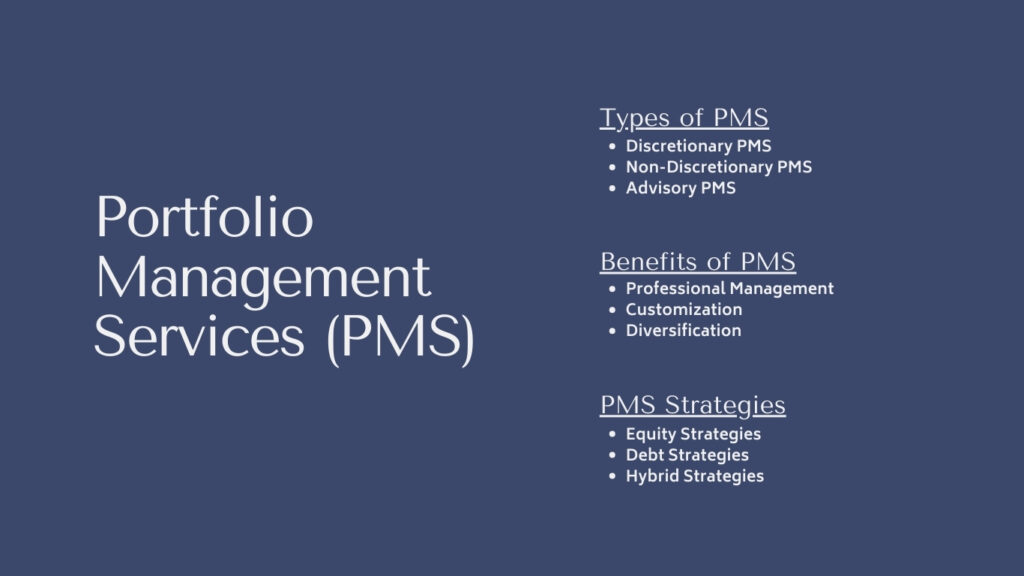
### Portfolio Management Services (PMS)
Portfolio Management Services (PMS) are specialized investment services offered by professional portfolio managers to manage an individual’s or institutional investor’s portfolio of securities to meet specified investment goals. PMS provides a range of customized investment solutions, ensuring the efficient management of the client’s investments.
### Types of PMS
1. **Discretionary PMS**
– The portfolio manager has full control over the investment decisions without requiring client consent for each transaction.
– Suitable for clients who prefer to rely on the expertise of professional managers.
2. **Non-Discretionary PMS**
– The portfolio manager provides advice and recommendations, but the client makes the final investment decisions.
– Ideal for clients who wish to be involved in the decision-making process.
3. **Advisory PMS**
– The portfolio manager offers investment advice, and the client executes the transactions based on the advice.
– Suitable for clients who prefer to have a hands-on approach with expert guidance.
### Benefits of PMS
1. **Professional Management**
– Investments are managed by experienced and skilled portfolio managers who use research and analysis to make informed decisions.
2. **Customization**
– Portfolios are tailored to meet the specific financial goals, risk tolerance, and investment preferences of each client.
3. **Diversification**
– Investments are spread across various asset classes, sectors, and geographies to mitigate risk and enhance returns.
4. **Regular Monitoring and Reporting**
– Portfolios are continuously monitored, and regular performance reports are provided to clients, ensuring transparency and informed decision-making.
5. **Flexibility**
– PMS offers flexibility in investment choices, allowing for adjustments based on market conditions and changing client objectives.
6. **Tax Efficiency**
– Portfolio managers design strategies to optimize tax benefits, ensuring tax-efficient returns for clients.
### PMS Strategies
1. **Equity Strategies**
– Focus on investing in stocks of companies with strong growth potential.
– Can include large-cap, mid-cap, and small-cap stocks based on the client’s risk appetite.
2. **Debt Strategies**
– Invest in fixed-income securities such as bonds, debentures, and other debt instruments.
– Suitable for clients seeking stable and regular income with lower risk.
3. **Hybrid Strategies**
– Combine both equity and debt instruments to balance risk and returns.
– Designed for clients looking for a mix of growth and income.
4. **Thematic and Sectoral Strategies**
– Focus on specific themes (e.g., technology, healthcare) or sectors.
– Ideal for clients who believe in the growth potential of particular sectors or themes.
### Choosing the Right PMS
1. **Assess Financial Goals**
– Define your investment objectives, time horizon, and risk tolerance.
2. **Evaluate Performance**
– Review the historical performance of different PMS providers and their investment strategies.
3. **Understand Fees and Charges**
– PMS typically involves management fees, performance fees, and other charges. Ensure you understand the fee structure and its impact on returns.
4. **Track Record and Reputation**
– Consider the experience and reputation of the portfolio manager and the PMS provider.
5. **Transparency and Reporting**
– Ensure the PMS provider offers regular and transparent reporting of portfolio performance and transactions.
### Conclusion
Portfolio Management Services offer a sophisticated and personalized approach to investment management. By leveraging the expertise of professional portfolio managers, investors can achieve their financial goals through well-structured and managed portfolios. Whether you are seeking growth, income, or a balanced approach, PMS provides the flexibility and customization needed to meet diverse investment needs.
